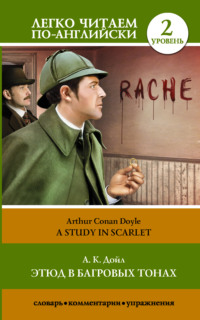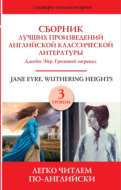Buch lesen: "Этюд в багровых тонах / A Study in Scarlet"
© Матвеев С. А., адаптация текста, комментарии, словарь, 2021
© ООО «Издательство АСТ», 2021
Arthur Conan Doyle
A Study in Scarlet
Part I
Chapter I
Mr. Sherlock Holmes
In the year 1878 I took my degree of Doctor of Medicine of the University of London, and proceeded to Netley to take the course for surgeons in the army. I completed my studies there, and became Assistant Surgeon1. I came to the Berkshires2, with whom I served at the fatal battle. There I was struck on the shoulder3 by a bullet, which shattered the bone. I was so weak that they sent me back to England.
I had neither friends nor relatives in England. I came to London. There I stayed for some time at a private hotel. One day I was at a bar, when someone tapped me on the shoulder. I turned round and recognized Stamford. The sight of a friendly face in London is a pleasant thing to a lonely man. I asked him to lunch with me, and we went together in a hansom.
“Whatever are you doing, Watson?” he asked, as we rattled through the London streets. “You are as thin as a lath.”
“Looking for lodgings.” I answered. “I want to get comfortable rooms at a reasonable price.”
“That’s strange,” remarked my companion; “you are the second man today who says so.”
“And who is the first?” I asked.
“A fellow who is working at the chemical laboratory. He cannot get someone for the nice rooms which he found, and which were too much for his purse.”
“Oh!” I cried, “if he really wants someone to share the rooms and the expense, I can be his partner.”
Stamford looked at me.
“You don’t know Sherlock Holmes yet,” he said.
“What is there against him?”
“Oh, I didn’t say there was anything against him. But he is an enthusiast in some branches of science. Anyway, he is a decent fellow enough.”
“I want to meet him,” I said. “How can I meet this friend of yours?”
“He is at the laboratory, I think” said my companion. “If you like, we can meet him after luncheon.”
“Certainly,” I answered.
We turned down a narrow lane and passed through a small side-door. Then we ascended the bleak stone staircase. Near the further end a passage led to the chemical laboratory.
This was a lofty chamber with countless bottles. Broad, low tables were scattered about. There was only one man in the room, who was bending over a table. He was absorbed in his work. Suddenly he sprang to his feet with a cry of pleasure.
“Great!” he shouted to my companion. “Look! It is a re-agent which is precipitated by hemoglobin4, and by nothing else.”
“Dr. Watson, Mr. Sherlock Holmes,” said Stamford.
“How are you?” he said cordially. “You visited Afghanistan, I see.”
“How did you know that?” I asked in astonishment.
“Never mind,” said he, chuckling to himself. “The question now is about hemoglobin. Do you see the significance of this discovery?”
“It is interesting, no doubt,” I answered, “but practically…”
“It is the most practical discovery for years. It gives us an infallible test for blood stains. Come over here now!” He drew me over to the table. “Let us have some fresh blood,” he said. He dug a long bodkin into his finger, and drew off the drop of blood in a chemical pipette. “Now, I add this small quantity of blood to water. You perceive that the mixture has the appearance of pure water. The proportion of blood is one in a million. However, we shall be able to obtain the characteristic reaction.”
He threw into the vessel a few white crystals, and then added some drops of a transparent fluid. In an instant the contents changed its colour.
“Ha! ha!” he cried. He was as delighted as a child with a new toy. “What do you think of that? It acts as well whether the blood is old or new. Hundreds of criminals will pay the penalty of their crimes.”
“Indeed!” I murmured.
“For example, we see brownish stains upon the criminal’s clothes. Are they blood stains, or mud stains, or rust stains, or fruit stains, or what are they? That is a question which puzzles many experts, and why? Because there was no reliable test. Now we have the Sherlock Holmes’ test!”
His eyes glittered as he spoke, and he put his hand over his heart and bowed.
“Congratulations,” I remarked. I was surprised at his enthusiasm.
“I can name many cases in which this test will be decisive.”
“We came here on business5,” said Stamford. He sat down on a high three-legged stool, and pushed another one in my direction with his foot. “My friend is looking for a room, and you were complaining that you could get no one to share expenses with you. So, I bring you together.”
Sherlock Holmes seemed delighted.
“I know a good suite in Baker Street,” he said. “You don’t mind the smell of strong tobacco, I hope?”
“I smoke myself,” I answered.
“That’s good. I have chemicals, and occasionally do experiments. Will that annoy you?”
“By no means.”
“Moreover, at times I don’t open my mouth for days. You must not think I am sulky when I do that. And what about you? It’s better for two fellows to know one another before they begin to live together.”
I laughed.
“I have a bull pup6,” I said, “I hate noise, and I am extremely lazy. I have other vices, but those are the principal ones.”
“Is the violin-playing some noise for you?” he asked, anxiously.
“It depends on the player,” I answered.
“Oh, that’s all right,” he cried, with a merry laugh. “I think we may begin to live together, if the rooms are agreeable to you.”
“When shall we see them?”
“Come to me at noon tomorrow, and we’ll go there together,” he answered.
“All right – noon exactly,” said I.
We left him working among his chemicals, and we walked together towards my hotel.
“By the way,” I asked suddenly, “how did he know that I had come from Afghanistan?”
My companion smiled.
“That’s his little peculiarity,” he said.
“Oh! a mystery?” I cried. “This is very piquant.”
Stamford bade me good-bye.
“I think he knows more about you than you about him. Good-bye.”
“Good-bye,” I answered, and strolled on to my hotel.
Chapter II
The Science of Deduction
We met next day and inspected the rooms at No. 221B, Baker Street. They consisted of a couple of comfortable bed-rooms and a single large sitting-room, with two broad windows. The apartments were desirable in every way. That evening I moved my things from the hotel, and on the following morning Sherlock Holmes followed me with several boxes and portmanteaus.
Holmes was certainly not a difficult man to live with. He was quiet, and his habits were regular. He breakfasted and went out early in the morning. Sometimes he spent his day at the chemical laboratory, sometimes in the dissecting-rooms7, and occasionally in long walks. Sometimes he was lying upon the sofa in the sitting-room, and he was not uttering a word or moving a muscle from morning to night.
As the weeks went by, my interest in him gradually deepened and increased. In height he was rather over six feet, and excessively lean. His eyes were sharp and piercing; and his hawk-like nose was very thin. His chin marked the man of determination.
His ignorance was as remarkable as his knowledge. Of contemporary literature, philosophy and politics he knew nothing. And my surprise reached a climax, when I found incidentally that he was ignorant of the Copernican Theory and of the composition of the Solar System.
“You will be astonished,” he said, smiling. “Now that I do know it I shall do my best to forget it.”
“To forget it!”
“You see,” he explained, “a man’s brain is like a little empty attic. A fool brings there all the lumber of every sort that he sees. But a wise man is very careful as to what he takes into his brain-attic. He will have nothing but the tools which may help him to do his work.”
“But the Solar System!” I protested.
“What is it to me?” he interrupted impatiently; “you say that we go round the sun. If we go round the moon it will not make difference to me or to my work.”
During the first week or so we had no visitors, and I thought that my companion was a friendless man. Presently, however, I found that he had many acquaintances in different classes of society. There was one little sallow rat-faced8, dark-eyed fellow, Mr. Lestrade, who came three or four times in a single week. One morning a young girl arrived, and stayed for half an hour or more. On another occasion an old white-haired gentleman had an interview with my companion; and on another a railway porter9 in his velveteen uniform. When these individuals came, Sherlock Holmes asked me to go to my bed-room. He always apologized to me for this inconvenience.
“I use this room as a place of business,” he said, “and these people are my clients.”
It was on the 4th of March. I rose earlier than usual. I rang the bell and gave our landlady a signal that I was ready. Then I picked up a magazine from the table. One of the articles had a pencil mark, and I began to read it.
Its ambitious title was “The Book of Life,” and it attempted to show how much an observant man might learn by an accurate and systematic examination of everything. For me, it was a remarkable mixture of shrewdness and of absurdity. The writer claimed by a momentary expression, a twitch of a muscle or a glance of an eye, to fathom a man’s inmost thoughts.
Observation and analysis! That’s all.
“From a drop of water,” said the writer, “a logician10 can infer the possibility of an Atlantic or a Niagara. All life is a great chain. Like all other arts, the Science of Deduction and Analysis requires long and patient study to attain the highest possible perfection in it. By a man’s finger nails, by his coat-sleeve, by his boot, by his trouser knees, by the callosities of his forefinger and thumb, by his expression, by his shirt cuffs – by each of these things a man’s life is plainly revealed.”
“What ineffable twaddle!” I cried and slapped the magazine down on the table, “I never read such rubbish in my life.”
“What is it?” asked Sherlock Holmes.
“This article,” I said. “It irritates me. It is not practical. Let’s bring that author to a carriage on the underground, and ask to give the trades of all the travellers. I will lay a thousand to one against him.”
“And you will lose your money,” Sherlock Holmes remarked calmly. “As for the article11 I wrote it myself.”
“You!”
“Yes. The theories which are chimerical to you, are really extremely practical – so practical that I depend upon them for my bread and cheese12.”
“And how?” I asked involuntarily.
“Well, I’m a consulting detective, if you can understand what that is. Here in London we have lots of Government detectives and lots of private ones. When these fellows don’t know what to do, they come to me, and I help them. You saw Mr. Lestrade, he is a well-known detective. But sometimes even he doesn’t know what to do.”
“And these other people?”
“They are people who are in trouble about something. I listen to their story, they listen to my comments, and then I earn some money.”
“But do you mean to say,” I said, “that you here can unravel some knot which other men can’t?”
“Quite so. I have intuition. You see I have a lot of special knowledge which I apply to the problem, and which facilitates matters wonderfully. The rules of deduction in that article which aroused your scorn, are invaluable to me in practical work. You were surprised when I told you about Afghanistan.”
“Someone told you about it, no doubt.”
“Nothing of the sort. I knew you came from Afghanistan. What did I think? Here is a gentleman of a medical type, but with the air of a military man. Clearly an army doctor, then. He came from the tropics, for his face is dark, and that is not the natural tint of his skin, for his wrists are fair. He underwent hardship and sickness, as his haggard face says clearly. His left arm is injured. Where did an English army doctor meet all this? Clearly in Afghanistan. I then remarked that you came from Afghanistan, and you were astonished.”
“It is simple enough as you explain it,” I said. “You remind me of Edgar Allen Poe’s Dupin13.”
Sherlock Holmes rose and lit his pipe.
“You think that you are complimenting me,” he observed. “Now, in my opinion, Dupin was a very inferior fellow. He had some analytical genius, no doubt; but he was not a phenomenon as Poe imagined.”
“And what about Gaboriau’s works14?” I asked. “What do you think of Lecoq? Is he a real detective?”
Sherlock Holmes sniffed sardonically.
“Lecoq was a miserable bungler,” he said, in an angry voice; “The question was how to identify an unknown prisoner. I can do it in twenty-four hours. Lecoq took six months or so. These books can teach the detectives what to avoid.”
I walked over to the window, and looked out into the busy street.
“This fellow may be very clever,” I said to myself, “but he is certainly very conceited.”
“There are no crimes and no criminals in these days,” he said, querulously. “No use to have brains in our profession. I can make my name famous.”
I was annoyed at his bumptious style of conversation. I decided to change the topic.
“I wonder what that fellow is looking for?” I asked. A man was walking slowly down the other side of the street. He had a large blue envelope in his hand.
“You mean the retired sergeant of Marines15,” said Sherlock Holmes.
“Oh!” thought I to myself. “He knows that I cannot verify his guess.”
Suddenly the man saw the number on our door, and ran rapidly across the roadway. We heard a loud knock, a deep voice below, and heavy steps.
“For Mr. Sherlock Holmes,” he said. He stepped into the room and handed my friend the letter.
Here was an opportunity to check my companion’s words.
“May I ask you,” I said, “what your trade may be?”
“Commissionaire, sir,” he said, gruffly.
“And you were?” I asked, with a malicious glance at my companion.
“A sergeant, sir, Royal Marine Light Infantry16, sir.”
Chapter III
The Lauriston Garden Mystery
This was the fresh proof of the practical nature of my companion’s theories. My respect for his powers of analysis increased wondrously. When I looked at him he was reading the note.
“How did you deduce that?” I asked.
“Deduce what?” said he, petulantly.
“That he was a retired sergeant of Marines.”
“I have no time for trifles,” he answered, brusquely; then with a smile, “Excuse my rudeness. So you actually were not able to see that that man was a sergeant of Marines?”
“No, indeed.”
“Even across the street I saw a great blue anchor tattooed on the back of his hand. He had a military carriage17, and side whiskers. He was a man of self-importance and a certain air of command. You observed the way in which he held his head and swung his cane. A steady, respectable, middle-aged man – a sergeant.”
“Wonderful!” I ejaculated.
“That’s nothing,” said Holmes. “I said just now that there were no criminals. I am wrong – look at this!”
He gave me the note.
“Oh,” I cried, “this is terrible!”
This is the letter:
“My Dear Mr. Sherlock Holmes,
“During the night at 3, Lauriston Gardens, off the Brixton Road, a policeman saw a light about two in the morning. The house was empty. He found the door open, and in the front room, which is bare of furniture, discovered the body of a gentleman. The gentleman was well dressed, and had cards in his pocket with the name of ‘Enoch J. Drebber, Cleveland, Ohio, U.S.A.’ The policeman saw no robbery. There are marks of blood in the room, but there is no wound upon his person. How did he come into the empty house; indeed, the whole affair is a puzzler. If you come round to the house any time before twelve, you will find me there. If you are unable to come I shall give you all the details. Please favour me with your opinion.
Yours faithfully,
Tobias Gregson.”
“Gregson is the smartest of the policemen of the Scotland Yard,” my friend remarked; “he and Lestrade are both quick and energetic, but conventional.”
“Surely there is not a moment to lose,” I cried, “shall I go and order you a cab?”
“I’m not sure about whether I shall go. I am incurably lazy.”
“Isn’t this your chance?”
“My dear friend, if I unravel the whole matter, you may be sure that Gregson and Lestrade will pocket all the credit18. However, we may go and have a look. Why not? Come on! Get your hat,” he said.
“You wish me to come?”
“Yes, if you have nothing better to do.”
A minute later we were both in a hansom. We were driving furiously for the Brixton Road.
It was a foggy, cloudy morning. My companion was talking about fiddles. As for myself, I was silent, for the dull weather depressed my spirits.
Number 3, Lauriston Gardens, was one of four houses which stood back some little way from the street. Two of them were occupied and two were empty. There was a “To Let” card near the house. A small garden separated each of these houses from the street, and was traversed by a narrow pathway. It was yellowish in colour, and consisted of a mixture of clay and of gravel. The whole place was very sloppy from the night rain.
Sherlock Holmes lounged up and down the pavement, and gazed vacantly at the ground, the sky, the opposite houses and the line of railings. Then he proceeded slowly down the path, or rather down the fringe of grass, and looked at the ground. Twice he stopped. He smiled, and uttered an exclamation of satisfaction.
At the door of the house, a tall, white-faced, flaxen-haired19 man met us. He had a notebook in his hand. He rushed forward and wrung my companion’s hand with effusion.
“It is indeed kind of you to come,” he said, “My colleague, Mr. Lestrade, is here.”
Holmes glanced at me and raised his eyebrows sardonically.
“With two such men as yourself and Lestrade here, I am useless,” he said.
Gregson rubbed his hands.
“I think,” he answered; “it’s a queer case, and I knew your taste for such things.”
“You did not come here in a cab?” asked Sherlock Holmes.
“No, sir.”
“Nor Lestrade?”
“No, sir.”
“Then let us go and look at the room.”
And Sherlock Holmes entered the house.
A short passage led to the kitchen and offices. I saw two doors to the left and to the right. One of these was closed. The other belonged to the dining-room, where the mysterious affair occurred. Holmes walked in, and I followed him.
It was a large square room without furniture. A vulgar paper adorned the walls. Opposite the door was a showy fireplace, surmounted by a mantelpiece. On one corner of this was the stump of a red wax candle. The window was so dirty that the light was hazy and uncertain. All these details I observed afterwards.
A single grim motionless figure lay upon the floor. It was a man about forty-three or forty-four years of age, middle-sized, broad shouldered, with curling black hair, and a short stubbly beard. He was dressed in a frock coat20 and waistcoat, with light-coloured trousers. A top hat21 was placed upon the floor beside him. His hands were clenched and his arms thrown abroad22, while his legs were interlocked23. On his rigid face there stood an expression of horror and of hatred. This malignant and terrible contortion, the low forehead, blunt nose, and prognathous jaw24 gave the dead man an ape-like25 appearance.
Lestrade was standing by the doorway, and greeted my companion and myself.
Sherlock Holmes approached the body. He knelt down and examined it intently.
“You are sure that there is no wound?” he asked. He pointed to numerous gouts and splashes of blood which lay all round.
“Yes!” cried both detectives.
“Then, of course, this blood belongs to somebody else, maybe to the murderer, if it is a murder?”
As he spoke, his nimble fingers were flying here, there, and everywhere. They were feeling, pressing, unbuttoning, examining. Finally, he sniffed the dead man’s lips, and then glanced at the soles of his patent leather boots.
“You can take him to the mortuary now,” he said.
Four men entered the room, and they lifted and carried the stranger out. As they raised him, a ring tinkled down and rolled across the floor. Lestrade took it.
“There was a woman here,” he cried. “It’s a woman’s wedding-ring.”
He held it upon the palm of his hand. We all gazed at it.
“This complicates matters,” said Gregson.
“You’re sure it doesn’t simplify them?” observed Holmes. “What did you find in his pockets?”
“Here,” said Gregson. “A gold watch, No. 97163, by Barraud26, of London. Gold chain, very heavy and solid. Gold ring, with masonic device. Gold pin – bull-dog’s head, with rubies as eyes.
Russian leather card-case, with cards of Enoch J. Drebber of Cleveland. No purse, but seven pounds thirteen. Pocket edition of Boccaccio’s ‘Decameron,’27with name of Joseph Stangerson upon the fly-leaf28. Two letters – one addressed to E. J. Drebber and one to Joseph Stangerson.”
“At what address?”
“American Exchange, Strand – to be left till called for29. They are both from the Guion Steamship Company30, and refer to the boats from Liverpool. It is clear that this unfortunate man wanted to return to New York.”
“What about this man, Stangerson?”
“I sent advertisements to all the newspapers, sir,” said Gregson. “And one of my men went to the American Exchange.”
“What about Cleveland?”
“We telegraphed this morning.”
“What were your inquiries?”
“We simply detailed the circumstances, and said that we were glad to receive any information which could help us.”
Sherlock Holmes chuckled to himself. Suddenly Lestrade reappeared.
“Mr. Gregson,” he said, “I made a discovery of the highest importance! I carefully examined the walls. Come here. Now, stand there!”
He struck a match on his boot.
“Look at that!” he said, triumphantly.
In the corner of the room, across the wall there was in blood-red letters a single word – RACHE.
“What do you think of that?” cried the detective. “The murderer wrote it with his or her own blood. Why that corner? I will tell you. See that candle on the mantelpiece. It was the brightest corner of the room.”
“And what does it mean?” asked Gregson.
“Mean? It means that the writer was going to write the female name Rachel. But he or she had no time to finish. You can laugh, Mr. Sherlock Holmes. You may be very smart and clever, but the old hound is the best here!”
“I really beg your pardon!” said my companion. “You are certainly the best. I had no time to examine this room, but with your permission I shall do so now.”
And he whipped a tape measure31 and a large round magnifying glass32 from his pocket. With these two implements he trotted noiselessly about the room. Sometimes he stopped, occasionally knelt. For twenty minutes or more he continued his researches. In one place he gathered up very carefully a little pile of grey dust from the floor, and packed it in an envelope. Finally, he examined with his magnifying glass the word upon the wall. After that he was satisfied, for he replaced his tape and his glass in his pocket.
Gregson and Lestrade watched the manoeuvres of Sherlock Holmes with considerable curiosity and some contempt.
“What do you think of it, sir?” they both asked.
“You are doing so well now,” remarked my friend. “that I can’t interfere.” There was sarcasm in his voice as he spoke. “If you let me know how your investigations go,” he continued, “I shall be happy to give you any help I can. But I want to speak to the constable who found the body. Can you give me his name and address?”
“John Rance,” said Lestrade. “You will find him at 46, Audley Court, Kennington Park Gate.”
“Come along, Doctor,” said Holmes; “we shall go to him. I’ll tell you one thing which may help you in the case,” he turned to the two detectives. “It was a murder, and the murderer was a man. He was more than six feet high, was in the prime of life33, had small feet for his height, wore coarse, square-toed boots34 and smoked a cigar. He came here with his victim in a four-wheeled cab, which was drawn by a horse with three old shoes and one new one on his off fore leg35. The murderer had a florid face, and the finger-nails of his right hand were remarkably long. These indications may assist you.”
Lestrade and Gregson glanced at each other with an incredulous smile.
“How was this man murdered?” asked they.
“Poison,” said Sherlock Holmes curtly. “One other thing, Lestrade,” he added: “‘Rache,’ is the German for ‘revenge;’ so don’t look for Miss Rachel.”
Die kostenlose Leseprobe ist beendet.








